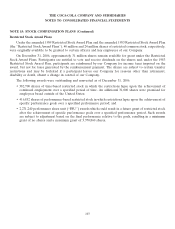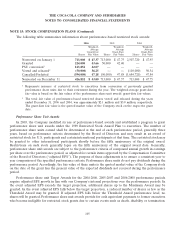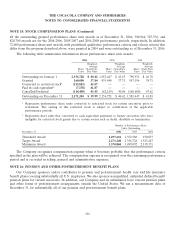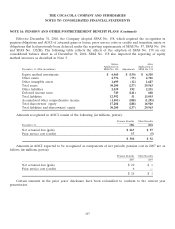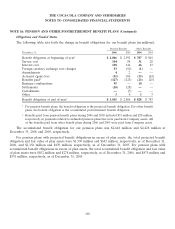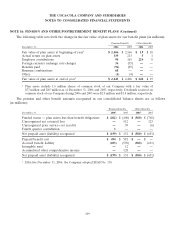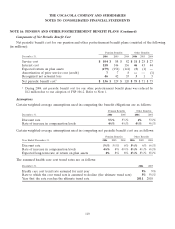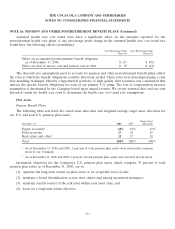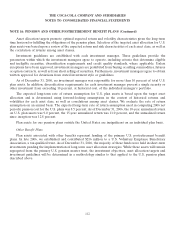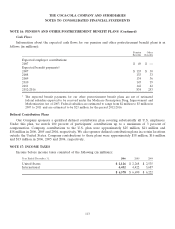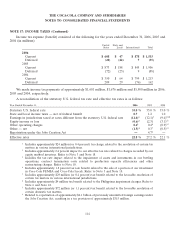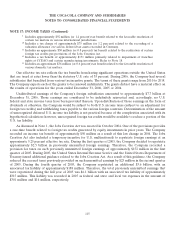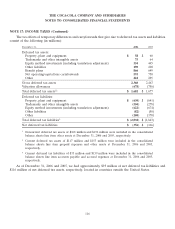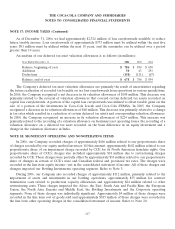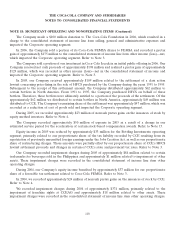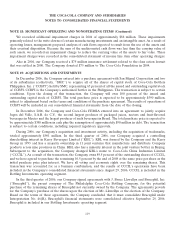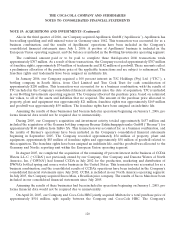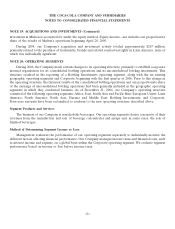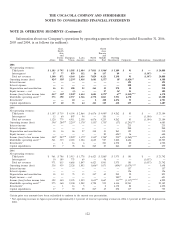Coca Cola 2006 Annual Report Download - page 114
Download and view the complete annual report
Please find page 114 of the 2006 Coca Cola annual report below. You can navigate through the pages in the report by either clicking on the pages listed below, or by using the keyword search tool below to find specific information within the annual report.THE COCA-COLA COMPANY AND SUBSIDIARIES
NOTES TO CONSOLIDATED FINANCIAL STATEMENTS
NOTE 16: PENSION AND OTHER POSTRETIREMENT BENEFIT PLANS (Continued)
Asset allocation targets promote optimal expected return and volatility characteristics given the long-term
time horizon for fulfilling the obligations of the pension plans. Selection of the targeted asset allocation for U.S.
plan assets was based upon a review of the expected return and risk characteristics of each asset class, as well as
the correlation of returns among asset classes.
Investment guidelines are established with each investment manager. These guidelines provide the
parameters within which the investment managers agree to operate, including criteria that determine eligible
and ineligible securities, diversification requirements and credit quality standards, where applicable. Unless
exceptions have been approved, investment managers are prohibited from buying or selling commodities, futures
or option contracts, as well as from short selling of securities. Furthermore, investment managers agree to obtain
written approval for deviations from stated investment style or guidelines.
As of December 31, 2006, no investment manager was responsible for more than 10 percent of total U.S.
plan assets. In addition, diversification requirements for each investment manager prevent a single security or
other investment from exceeding 10 percent, at historical cost, of the individual manager’s portfolio.
The expected long-term rate of return assumption for U.S. plan assets is based upon the target asset
allocation and is determined using forward-looking assumptions in the context of historical returns and
volatilities for each asset class, as well as correlations among asset classes. We evaluate the rate of return
assumption on an annual basis. The expected long-term rate of return assumption used in computing 2006 net
periodic pension cost for the U.S. plans was 8.5 percent. As of December 31, 2006, the 10-year annualized return
on U.S. plan assets was 9.0 percent, the 15-year annualized return was 11.0 percent, and the annualized return
since inception was 12.8 percent.
Plan assets for our pension plans outside the United States are insignificant on an individual plan basis.
Other Benefit Plans
Plan assets associated with other benefits represent funding of the primary U.S. postretirement benefit
plans. In late 2006, we established and contributed $216 million to a U.S. Voluntary Employee Beneficiary
Association, a tax-qualified trust. As of December 31, 2006, the majority of these funds were held in short-term
investments pending the implementation of long-term asset allocation strategies. While these assets will remain
segregated from the primary U.S. pension master trust, the investment objectives, asset allocation targets and
investment guidelines will be determined in a methodology similar to that applied to the U.S. pension plans
described above.
112



